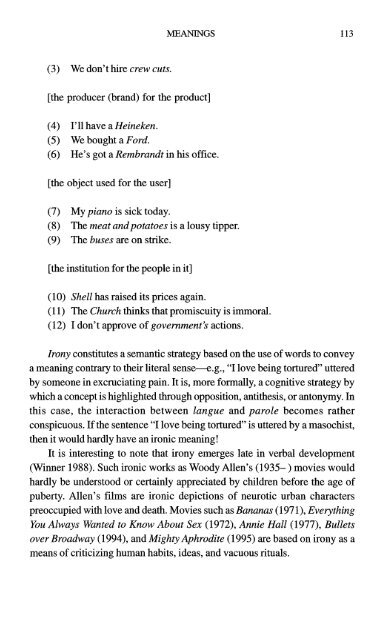A Basic Course in Anthropological Linguistics (Studies in Linguistic ...
A Basic Course in Anthropological Linguistics (Studies in Linguistic ...
A Basic Course in Anthropological Linguistics (Studies in Linguistic ...
You also want an ePaper? Increase the reach of your titles
YUMPU automatically turns print PDFs into web optimized ePapers that Google loves.
(3) We don’t hire crew cuts.<br />
MEANINGS<br />
[the producer (brand) for the product]<br />
(4) I’ll have a He<strong>in</strong>eken.<br />
(5) We bought a Ford.<br />
(6) He’s got a Rembrandt <strong>in</strong> his office.<br />
[the object used for the user]<br />
(7)<br />
(8)<br />
(9)<br />
My piano is sick today.<br />
The meat and potatoes is a lousy tipper.<br />
The buses are on strike.<br />
[the <strong>in</strong>stitution for the people <strong>in</strong> it]<br />
(10) Shell has raised its prices aga<strong>in</strong>.<br />
(1 1) The Church th<strong>in</strong>ks that promiscuity is immoral.<br />
(12) I don’t approve of government’s actions.<br />
Irony constitutes a semantic strategy based on the use of words to convey<br />
a mean<strong>in</strong>g contrary to their literal sense+.g., “I love be<strong>in</strong>g tortured” uttered<br />
by someone <strong>in</strong> excruciat<strong>in</strong>g pa<strong>in</strong>. It is, more formally, a cognitive strategy by<br />
which a concept is highlighted through opposition, antithesis, or antonymy. In<br />
this case, the <strong>in</strong>teraction between langue and parole becomes rather<br />
conspicuous. If the sentence “I love be<strong>in</strong>g tortured” is uttered by a masochist,<br />
then it would hardly have an ironic mean<strong>in</strong>g!<br />
It is <strong>in</strong>terest<strong>in</strong>g to note that irony emerges late <strong>in</strong> verbal development<br />
(W<strong>in</strong>ner 1988). Such ironic works as Woody Allen’s (1935- ) movies would<br />
hardly be understood or certa<strong>in</strong>ly appreciated by children before the age of<br />
puberty. Allen’s films are ironic depictions of neurotic urban characters<br />
preoccupied with love and death. Movies such as Bananas (197 1)’ Everyth<strong>in</strong>g<br />
You Always Wanted to Know About Sex (1972), Annie Hall (1977)’ Bullets<br />
over Broadway (1994), and Mighty Aphrodite (1995) are based on irony as a<br />
means of criticiz<strong>in</strong>g human habits, ideas, and vacuous rituals.<br />
113






